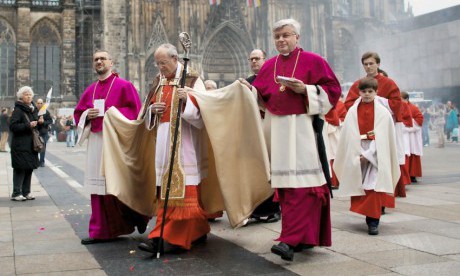Anyone following the news over the past few months could be forgiven for thinking that German Catholicism is uniformly liberal.
Fifty years after the Second Vatican Council, it appears that the Rhine may once again be flowing into the Tiber, to paraphrase Fr Ralph Wiltgen’s historic account of that council, in the lead-up to this year’s critical family synod.
But a closer look at the actual situation of the Church in Germany not only reveals clues as to why German clergy, theologians and others are wielding such enormous influence in Rome ahead of the synod.
It also shows that the Rhine’s waters are far from the fast-running liberal current that they appear to many outside observers.
In fact, the Church in Germany, though fed by several different streams and sources, to a large extent is dissipating into its secular environs.
The vast majority of the 24 million German Catholics in 2015 are neither practising their faith nor sufficiently aware of its teachings.
Church attendance hovers around the 12 per cent mark. More alarming still, a recent study showed that almost half of all priests neither pray daily nor go to Confession.
To be sure, other Western countries are registering similar numbers and trends. What is different in German-speaking Europe, however, are three important factors that need to be reckoned with in preparation for the synod.
First, while the Faith may continue to dissipate and membership decline, the Catholic community in Germany – in no small part due to the Church tax – is materially very rich and socially rather powerful, as well as politically influential.
The Church is the country’s second-largest employer, running everything from childcare centres to schools, retirement homes, libraries and hospitals. Catholic clergy belong to important public institutions such as the National Ethics Committee.
The contribution of German Catholic relief organisations to the world, meanwhile, is rightfully legendary. Continue reading
Sources
- Anian Christoph Wimmer is a German-Austrian broadcaster, writer and journalist. He is editor-in-chief of the weekly Munich newspaper Münchner Kirchenzeitung. The article above is from the Catholic Herald.
- Image: Spiegel Online
